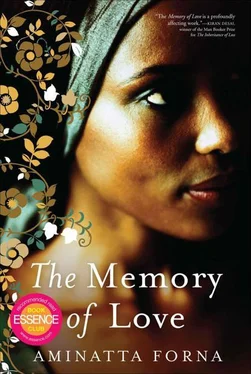‘He’s growing up fine, this one.’ She reaches out her hand to stroke Abass’s arm.
Abass doesn’t move, but stands, arms at his sides, his belly sticking out, while he continues to regard her.
‘No father.’ Yeama nods as she says this, as if to confirm the wisdom of her own observation. ‘But he has a good mother.’
There is a general murmuring of consent; Kai hears his cousin’s voice thanking Yeama for the compliment.
Yeama continues, ‘And he has you, too.’ She nods at Kai then gives Abass’s arm a final pat and pushes him gently in Kai’s direction.
Nobody expects them to sit long with the women, and so after a few minutes Kai makes his excuses and leaves. He and Abass walk down the hill towards the house. The boy is silent, keeping pace with Kai in the darkness.
It is coming, Kai knows, one day soon. Every time somebody like Yeama makes a remark it brings the day a little closer. Inside Abass’s head he can sense the child’s brain working, trying to form thoughts out of feeling, thoughts which will in turn give rise to the questions, questions that have yet to crystallise.
One day.
Three o’clock in the morning. Kai listens to Abass’s adenoidal breathing. The child asked to sleep in his bed again. Now he is lying, leg bent, flung out across the middle of the bed. Kai stares into the darkness, then slips out of bed and goes into the yard.
Kai wasn’t woken by dreams about the bridge, or even a dream at all. But a memory, a sudden intrusion of conscious thought upon his world of sleep. The last time he saw Abass’s father, sitting on the tailgate of a pickup, on his way to his station in the east. He made the journey home twice a month. Just as the vehicle had been about to move off he’d jumped down to shake hands with Kai and climbed back in. He was always particular about his beret; Kai watched him adjusting it and readjusting it against the wind as the pickup gathered speed, wearing his habitual expression of peaceable wonder. In another world he would have been happy as a postman or a farmer.
Rebels invaded the town where he was stationed two weeks later. For days his blackened corpse, fused flesh and rubber, lay on a traffic island from where no person dared to retrieve it.
Perhaps, thinks Kai, he should talk to his cousin. Suggest it was time they thought about telling Abass the circumstances behind his father’s death. He ponders the question a few moments. His thoughts move to his cousin, to the Pentecostalists to whom she has given space in the house, the slight distance she keeps even from her own son. Abass craves her, turns to Kai in her absence. It is not Abass she is protecting. But who is Kai to judge her? For he’d never told Nenebah about the bridge. Or of what happened with the young nurse, Balia. He’d hidden those things from Nenebah.
One night, lying beside her in bed, sleepless, knowing she too was awake. He heard her draw a breath as she half turned towards him and placed her hand on his chest. She moved her hand down across his chest, her fingertips brushed his nipples, which tightened instinctively in response. Then her fingers were on his belly, the muscles of which contracted almost painfully beneath her touch. Kai held his breath. He shivered, held on to the tightness of his stomach muscles, diverted all his mental energy towards her hand and felt himself respond supremely to her advance, so that by the time her fingers snagged softly in his pubic hair he was fully erect. Her fingers found his cock and closed around it. He exhaled. For a moment he relaxed. And was lost. He tried to regain control, to re-engage his mind with his body, with her hand. But it was impossible, the images crowded into his mind, jostling for control, squeezing out the present. Even when she replaced her hand with her mouth, all he felt was her tongue working around his limp state. The entirety of him rested curled inside her mouth, an entirely new sensation. It was she who eventually came up, leant over and kissed him on the mouth. Neither of them spoke. She’d tucked herself under his arm and gone to sleep. It was still good enough between them for that.
A month later came Tejani’s announcement of his departure. They’d discussed it many times before, Tejani the determined one from the start. Kai had seen his friend off, punched fists with him and promised to follow. But he had never followed.
Close at hand a dog adds its voice to those of the others. Kai thinks of the day and the journey he now has before him. He does not lack the courage for it. No.
Rather it was the courage to stay that had failed him.
‘How have you been sleeping? Any more dreams?’
Elias Cole laughs, a phlegm-filled rasp. ‘This is not the place for a good night’s sleep.’
‘You’re being woken?’
‘There’s always something, somebody dying or trying to. The doctors and nurses make it their business to interfere.’
‘Do you manage to sleep again?’
‘I wonder who’s next, afraid this sleep will be the final one. On the other hand, if the dream is good …’ The laugh again.
Adrian smiles. ‘I can ask the doctor to prescribe something, if you like.’
‘What would be the point?’
‘Let me know if you change your mind.’
‘Of course.’ He pulls himself up, in the slow, deliberate way of a man whose every movement is laced with pain. He coughs and the coughing takes over his whole body.
Adrian waits.
Elias Cole wipes his mouth with a cloth. ‘I’m not a superstitious man. I was born in the city. I don’t hold with Babagaleh’s country beliefs. For him there’s no such thing as a natural death, we’d all live for ever, but for the curses heaped upon us by our enemies.’ He looks up at Adrian. ‘In the dark all manner of thoughts come to mind. You begin to imagine.’
‘Imagine what?’
‘It’s something of a coincidence, is it not? The way I’m dying, so similar to Julius’s own end …’
‘And you think perhaps your pulmonary fibrosis is the result of a curse?’ Adrian shifts in his chair, interested. The old man turns, their eyes meet. Elias Cole smiles and in that moment looks suddenly quite different: keen, cold, alert. Adrian catches the glint in his eye. The side he sees of Cole is not his public face. Elias Cole had been quite a different animal on the outside, ten, twenty years ago. It occurs to Adrian he would not have liked to come up against him.
Adrian leans back.
‘Let’s just call it dramatic irony, shall we?’ says the old man.
Our first night together we dined at the Ocean Club. I felt people were staring at us. At a time when talk could have undesirable consequences, gossip filled the void. After we had eaten Saffia and I returned to the house on the campus.
The work on the house was finished and, on the whole, well executed. I guided Saffia from room to room. Some things still needed work. The stock of furniture that came with the property was underwhelming and looked as if it might have been chosen by a blind man. Curtains in a toxic shade of yellow. A wooden-framed sofa covered in red print. A chair covered in yet another brightly patterned fabric; it was a rocking chair, which we later discovered had a habit of overreaching its tipping point and depositing the occupant on the floor.
I was never a man of taste; the decor in my own apartment had never risen far above the merely functional. But Saffia had an eye for detail. And so in my imaginings I’d show her the house, newly roofed and painted. And then we would laugh together at the furnishings, and in the weeks that followed Saffia would make redecorating the house her first project. Or so I hoped.
She surveyed the room from the edge. Impossible not to notice how her gaze never alighted upon an object, but hovered restlessly. I made some quip or other, asking her opinion. A little game I had planned in which I pretended momentarily to admire the decor. Foolish, as it turned out. Saffia turned to me and smiled, held me in the same unseeing gaze with which she had contemplated the room, and said, ‘It’s a very fine house indeed, Elias. Thank you.’
Читать дальше












